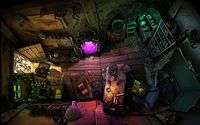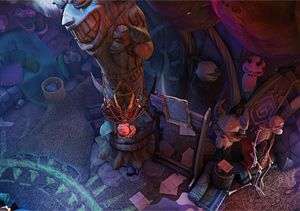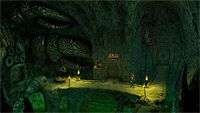The Book Of Unwritten Tales – Review
by Mark R

|
 I never did play the Monkey Island games. By the time my beloved text adventure had crawled from its ASCII crib via the crude storybook style graphic adventure of The Hobbit, and experimented its way through puberty to the animated stylings of the LucasArts stable, I was too engrossed in playing with light pens and speech synthesisers to even notice. This awkward sidestep in my gaming history has left a scar, however, because I’ve become the gamer-equivalent of the person who has never watched Monty Python or was unfortunate enough to miss The Two Ronnies as they discussed “fork ‘andles”, so that when others come together in appreciation of rubber chickens with a pulley in the middle, I stand silently and attempt to comfort myself as I fondly remember trying to reproduce Tracey Elvik’s Page 3 curves with my Trojan Cadmaster.
I never did play the Monkey Island games. By the time my beloved text adventure had crawled from its ASCII crib via the crude storybook style graphic adventure of The Hobbit, and experimented its way through puberty to the animated stylings of the LucasArts stable, I was too engrossed in playing with light pens and speech synthesisers to even notice. This awkward sidestep in my gaming history has left a scar, however, because I’ve become the gamer-equivalent of the person who has never watched Monty Python or was unfortunate enough to miss The Two Ronnies as they discussed “fork ‘andles”, so that when others come together in appreciation of rubber chickens with a pulley in the middle, I stand silently and attempt to comfort myself as I fondly remember trying to reproduce Tracey Elvik’s Page 3 curves with my Trojan Cadmaster.
The passing of time has, however, allowed the table to slowly turn, grinding heavily to the point where the snorts of derision flow in the opposite direction as I take joy in being one of the few who saw beyond the dazzling line-up of October releases, bypassing the likes of Rage, Kirby, and the behemothic Arkham City to the visual and comedic masterpiece that is King Art Games’ Book of Unwritten Tales.
While BoUT has only recently reached British shores, the German market has had it for the last two years where it held court at the top of the adventure game genre and became increasingly swathed in awards as news of the game spread to more review sites. Bringing it to an English speaking audience was less about getting it out there as soon as possible and more about ensuring that each character was perfectly portrayed and that none of the trademark humour was lost in translation. This is perhaps a vital piece of the puzzle as the attention to detail afforded by Mark Estdale when it came to rewriting the script to suit the English audience is what sets Unwritten Tales head and shoulders above all other non-native-tongued releases. From beginning to end, its self referential approach to the storyline and character portrayal is a delight to behold and checks every box thrown at it.
 The story itself is considerably more tongue in cheek than most you’ll ever come across, with the first few moments cemented in enough nods to let you know that this will undoubtedly be one of those Police Squad experiences where you may not necessarily catch every joke first time around, usually because you’re still laughing from the last one. To the more eagle-eyed player, however, there are countless pop culture references peppered throughout each level, from the introduction of one Professor MacGuffin to Princess Ivo’s humming of a familiar John Williams hook as she flicks forth a bullwhip to swing from one platform to another.
The story itself is considerably more tongue in cheek than most you’ll ever come across, with the first few moments cemented in enough nods to let you know that this will undoubtedly be one of those Police Squad experiences where you may not necessarily catch every joke first time around, usually because you’re still laughing from the last one. To the more eagle-eyed player, however, there are countless pop culture references peppered throughout each level, from the introduction of one Professor MacGuffin to Princess Ivo’s humming of a familiar John Williams hook as she flicks forth a bullwhip to swing from one platform to another.
On being released from his airborne prison, the aforementioned Professor MacGuffin finds himself on the outskirts of a snow-covered town populated by gnomes. One such gnome is Wilbur Weathervane who, on discovering the professor, is tasked to deliver the “One Ring” to the Arch Mage in a neighbouring city. Cue several lines of cleverly-pointed dialogue pondering how someone could entrust something so important as this “One Ring” to the hands of an unwitting halfling and how it would surely make more sense for the powerful wizard himself to make the delivery, and our main story is now underway.
 |
 |
 |
 |
 |
 |
Throughout the four chapters of the game, the story will turn in such a way as to flit between timelines where you’ll play as either Wilbur, Princess Ivo, Nate the smuggler or Critter… who can only really be described as a lilac Chewbacca to Nate’s Han Solo although, to be honest, the character of Nate is more like Captain Mal from Firefly so perhaps Critter is more akin to being Kaylee Frye, but with body hair issues. Each character has their own distinct personality and serves their own purpose when situations start to get a little sticky. As the game progresses the four individual timelines cross to the point where you can play as any one of the characters at will, selecting them from an avatar menu at the top of the screen, and it’s at this point that the gameplay becomes more about considering each move than running ahead to see how many objects are interactive in each scene.
 The interactivity plays an important part in most of the in-game puzzles whereby something that is apparently unusable could eventually be of vital importance, although not necessarily in the same state in which you picked it up. This became increasingly obvious when I had to find some purple paint when I hadn’t managed to see any on my travels but, with some ingenuity along with a pinch of trial and error as well as some seemingly-unrelated inventory items, was able to create some that would do the job. While some puzzles involved a degree of back and forth in typical fetch-quest fashion, most were attainable without putting in too much effort and, thankfully, there wasn’t a single slide puzzle in sight.
The interactivity plays an important part in most of the in-game puzzles whereby something that is apparently unusable could eventually be of vital importance, although not necessarily in the same state in which you picked it up. This became increasingly obvious when I had to find some purple paint when I hadn’t managed to see any on my travels but, with some ingenuity along with a pinch of trial and error as well as some seemingly-unrelated inventory items, was able to create some that would do the job. While some puzzles involved a degree of back and forth in typical fetch-quest fashion, most were attainable without putting in too much effort and, thankfully, there wasn’t a single slide puzzle in sight.
As with all new IPs, there is always that period where you wonder if taking a chance on playing the game will be a worthwhile risk or will ultimately end up in time wasted that would have been better spent on other titles. The initial draw towards The Book Of Unwritten Tales was, for me, the hilarious trailer along with what few screenshots were available at the time. While the humour is very self referential and pokes fun at various aspects of gaming such as the point and click adventure genre, fetch quests, and in-game stereotypes. There is one particular scene which, even at perhaps five minutes long, was still too short in how perfectly constructed it was with the carefully-considered dialogue and observations by the characters as they described their MMO and RPG characters, and will hopefully go down in history as one of the great comedic video game set-pieces. It was this humour, along with the beautifully crafted environments, that pulled me in and further away from my comfort zone of the heavily-textured and mesh-ridden WRPG title.
All technological advances with various engines such as CryENGINE 3 or id Tech 5 aside, there are few games that have that particular graphical quality which can immediately result in a sharp intake of breath coupled with an internal “wow”. The Book of Unwritten Tales is one such game, however, and the care with which each individual pixel is represented on screen is evident from that first moment where the intro begins to load. The deep contrasts and smatterings of vivid light in darker scenes are reminiscent of Joseph Wright’s “An Experiment on a Bird in the Air Pump”, and the attention to detail further reinforces this feeling with every insignificant area of the screen given as much thought as the characters themselves. Something which, in my opinion, is often overlooked in the modern gaming industry in favour of women with gravity defying breasts or more slowmo explosions than you can shake John Woo at.
 As the game progresses, so too does the quality of the environments and it’s all too easy to temporarily forget about quest lines as you soak up the meticulously designed ambience and pour over each tiny corner of the screen to see what lies hidden in the shadows. Standing in a cavern where the only source of light is a bubbling crater of lava, with flames dancing on the horizon, it’s difficult to pay attention to the talkative dragon when there’s so much going on in the background but, to be perfectly honest, that sort of thing really appeals to me as a graphic designer and makes for a more visually-rewarding experience overall.
As the game progresses, so too does the quality of the environments and it’s all too easy to temporarily forget about quest lines as you soak up the meticulously designed ambience and pour over each tiny corner of the screen to see what lies hidden in the shadows. Standing in a cavern where the only source of light is a bubbling crater of lava, with flames dancing on the horizon, it’s difficult to pay attention to the talkative dragon when there’s so much going on in the background but, to be perfectly honest, that sort of thing really appeals to me as a graphic designer and makes for a more visually-rewarding experience overall.
It’s not all about the graphics and humour though, as Unwritten Tales has so many other reasons to steal your life away for a good twenty or so hours. The pixel hunting can be a joy if you don’t resort to the “show all hotspots” key, as there are so many objects with which to interact, although they’re not always necessary to the story and may be nothing more than additional comic relief. The voice acting is superb and, in my opinion, stands out above all other releases from 2011. While there are four main characters to play as, the main protagonist is, as mentioned earlier, Wilbur Weathervane and is voiced superbly by Nicholas Aaron who gives a very understated performance. In fact, all of the voice talent have a very laid back approach to their roles which, I hasten to add, is a positive rather than a negative. Nobody comes across as being over the top, hamming it up, or taking too much of a tongue in cheek approach to their characterisation and so there is never a point where that fourth wall is broken by a forced accent, and you’re forever held within the game world. The sign of perfect voice acting.
 |
 |
 |
 |
 |
 |
Benny Oschmann’s epic score shifts between the heavily orchestrated and driving Overture through to perfectly-balanced incidental theming which, thankfully, never detract from the task in hand or become a jarring annoyance like so many others have. As beautiful as it is, however, there were times when I wanted to hear more of it and found that it was almost overshadowed by the rest of the game and given a little too much of a back seat. While I understand the reasoning behind it, assuming that the developer wanted the game to be more immersive and a heavily-present score could quite easily rip the player away from said immersion, I would have loved to hear more of Oschmann’s work throughout each of the chapters.
If I was forced to find any negatives with The Book of Unwritten Tales, it would have to be with the ending itself. There’s nothing intrinsically wrong with it, per se, and I suppose if I had to be perfectly honest I would have to admit that the way it was handled was actually perfect, given the circumstances, but there was just that moment where… and this may be a spoiler so stop reading here if you don’t want to know… I thought the game had finished and was looking forward to the typical congratulatory scene when, all of a sudden, it became clear that it wasn’t actually the end. We’re not talking about some long, drawn out, Lord Of The Rings ending where you could quite literally stick a pin in it every five minutes for the last forty minutes and call it a decent ending, but the game could have ended where you expect it to. That it doesn’t, isn’t a game-killer by any stretch of the imagination and, in fact, the ending is perhaps one of the most intelligently considered that I’ve ever come across in some thirty years of gaming BUT, as smart as it was, it was also unnecessary. Endearing, appreciated, incredibly smart… but unnecessary nonetheless. Did it let down the rest of the game though? Absolutely not. There isn’t much that could pull down a game of this calibre and, even though I write this several weeks after completing it, I still wish I was back in that mystical land with more to see and more adventures ahead.
Pros- Fantastically funny and self referential
- Beautifully designed environments
- Superb voice acting and characterisation
- Tongue in cheek storyline that has a number of turns
- Intelligently handled ending, albeit unnecessary
- The game isn't perfect, as I'm not sure that's even possible, but there's nothing that I could say was an actual negative, just an imperfection.
The problem with a game such as this is that it's difficult to discuss the game itself without giving away too many spoilers, so the best I can do is to summarise with my own feelings on the experience. The first smile came within seconds of the game starting and my first real belly laugh was within the first thirty minutes. Everything about BoUT transports you away from the mundanity of life and into a beautifully vivid world where anything is possible, and it never ceases to enchant. When the story comes to an eventual close, there is a feeling of satisfaction but with an underlying pang of mourning in knowing that this isn't an RPG where you could perhaps eke out another twenty or thirty hours by dawdling around... this is, unfortunately, game over. With so many dialogue options from which to choose, however, I suspect there may be several ways to reach that final inevitable destination, and that's the best anyone can hope for from a game such as this.
Last five articles by Mark R
- From Acorns to Fish
- Alone In The Dark
- Why Borderlands is Better Than Borderlands 2
- Falling Short
- The Division: A Guide to Surviving the Dark Zone Solo




























It is just a shame that BoUT took so long to reach the UK, but perhaps with all the attention that this title has (rightly) received, we’ll be seeing the next one a little sooner, especially seeing as it is already on release in Germany. The game looks stunning and is certainly among the higher end point and click titles, so perhaps it will swing more ex-verterans back in this direction, proving that the genre is still a relevant one, that is hiding some real treasures. Excellent review!
I have to play this at some point soon, and I’m basically counting down to when my new PC arrives so I can finally play the crap out of this
[...] the success of The Book of Unwritten Tales, just one of a number of top point and click adventures released in the last 12 months, Nordic [...]